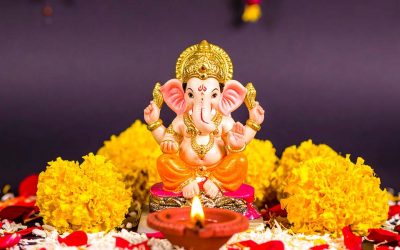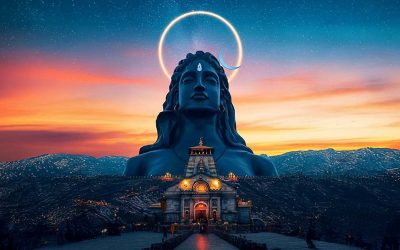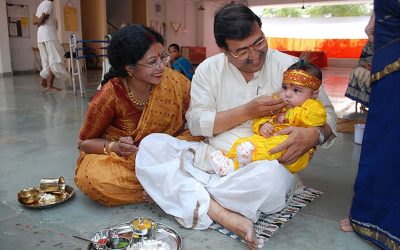The Role of Punyahavachanam in Cultural Heritage
What is Punyahavachanam?
Punyahavachanam is a traditional Hindu purification ceremony. This ritual is usually conducted on the 11th day after the significant event. It is carried out to sanctify and purify new homes, temples, or other structures, and is essential at various life stages such as after a birth, before major events, or to address untoward incidents. This ritual includes a series of steps designed to cleanse the environment and the people within it, making the space spiritually ready for auspicious activities.
The Significance of Punyahavachanam
The main goal of Punyahavachanam is to remove any negative energies or influences, creating a sacred space that is pure and conducive to spiritual activities. By calling on divine presences and using sacred elements like water, fire, and mantras, this ritual establishes divine protection and fosters a positive environment. It marks the start of new beginnings with sanctity and grace, ensuring that life’s important events can proceed with divine blessings.
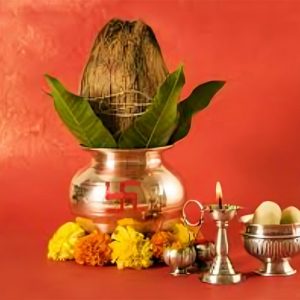
Why Punyahavachanam is Needed
In Hindu tradition, every significant effort or life event is preceded by a purification to attract positive energy and divine presence. Punyahavachanam is needed to:
- Cleanse a space of any previous negative influences or impurities.
- Invoke divine blessings and protection for new ventures or life stages.
- Maintain spiritual cleanliness and sanctity in places of worship and living.
Things to Do for Punyahavachanam
To conduct Punyahavachanam, several preparations and ritualistic steps are necessary:
- Kalasha Sthapana: Setting up a sacred pot filled with water, adorned with mango leaves and a coconut, symbolizing the universe.
- Mantra Chanting: Reciting Vedic hymns to call deities and purify the surroundings.
- Offerings: Presenting flowers, fruits, and other sacred materials to the deities.
- Fire Rituals: Performing homa (fire offerings) to invoke divine energy through the sacred element of fire.
How Punyahavachanam is Done
- The process of Punyahavachanam starts with cleaning the ritual space using holy materials like cow dung and purifying water.
- Mantras are then chanted to invite gods such as Ganesha, Lakshmi, and other deities relevant to the occasion.
- A sacred fire is lit to offer oblations of ghee and grains, which sanctifies the space through the elemental energy of fire.
- Sanctified water from the Kalasha is sprinkled on participants and around the space, symbolizing the cleansing of physical and spiritual impurities.
- The ritual concludes with prayers and circumambulation, solidifying the sanctity of the event.
Advantages and Benefits of Punyahavachanam
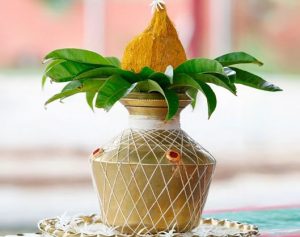
- Establishes a spiritually clean and protective boundary against negative influences.
- Aligns a space or individual with cosmic and divine energies, enhancing spiritual receptivity.
- Provides a purified environment conducive to spiritual practices and auspicious undertakings.
- Ensures peace, prosperity, and spiritual well-being through divine blessings.
The Significance of Punyahavachanam in Preserving Cultural Heritage
- It gives you a connection to your roots, reinforcing identity and continuity.
- It safeguards historical wisdom, enriching communities while promoting unity and respect across diverse groups.
- By practicing Punyahavachanam, Hindus honor deities and ancestors, passing sacred traditions to future generations and ensuring the thriving of Hindu spiritual practices.
- It teaches you to respect nature and the divine, crucial for maintaining spiritual health and purity within the community.
- By showcasing Vedic traditions and philosophies, it serves as an educational tool that fosters a deeper connection to Hindu heritage.
- Elders share the significance of each ritual step, recounting sacred texts and teachings, deepening understanding and appreciation among younger generations.
- It helps you enhance your spirituality and devotion and allows you to deeply explore your faith, undergo spiritual purification, and clarify your cosmic purpose.
- It is essential for maintaining the spiritual and cultural fabric of Hindu society, enhancing communal and spiritual life and preserving a timeless tradition.
Challenges in Modern Times and Efforts for Revival
The practice of Punyahavachanam, like many traditional rituals, faces challenges in contemporary society. Modernization has led to a distancing from traditional practices, and you may find it difficult to maintain these rituals due to logistical and cultural barriers. Additionally, the younger generation might find it hard to relate to these practices without proper guidance and understanding.
In response to these challenges, numerous Hindu communities worldwide are making concerted efforts to revive Punyahavachanam. Workshops, educational programs, community events, and blogs like this are organized to teach the ritual’s significance and procedures. Online platforms and social media are increasingly used to reach a broader audience, providing resources and virtual participation opportunities to those unable to attend in person. These initiatives are crucial for keeping the tradition alive and relevant in the globalized context.
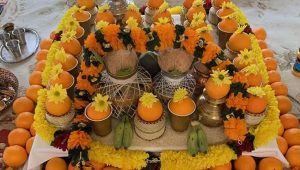
Conclusion
As we move forward, the role of Punyahavachanam in preserving Hindu cultural heritage remains significant. It acts as a bridge connecting the past with the present, offering spiritual continuity and cultural coherence. Its preservation is vital for maintaining the community’s cultural identity and spiritual foundation.
Punyahavachanam is more than just a ritual; it reflects the deep spiritual and cultural wisdom of Hinduism. This ceremony plays a vital role in purifying, protecting, and blessing individuals and spaces, helping ensure a positive and harmonious beginning for important life events. By bringing people together, passing on cultural values, and fostering spiritual growth, Punyahavachanam remains a vital tradition. It helps keep the rich cultural heritage of Hinduism alive, guiding future generations toward a spiritually enriched life. Through this practice, the essence of Hindu culture is celebrated and preserved, making it a key part of the spiritual and cultural identity of its followers.
